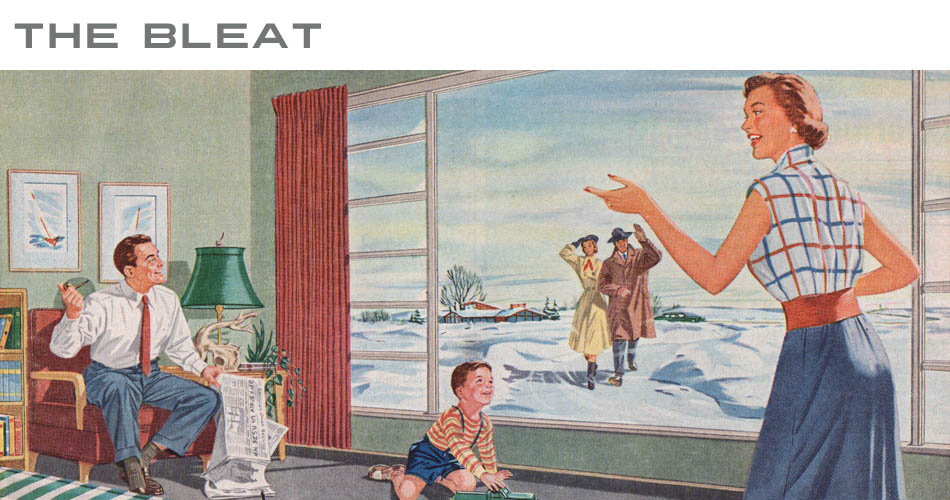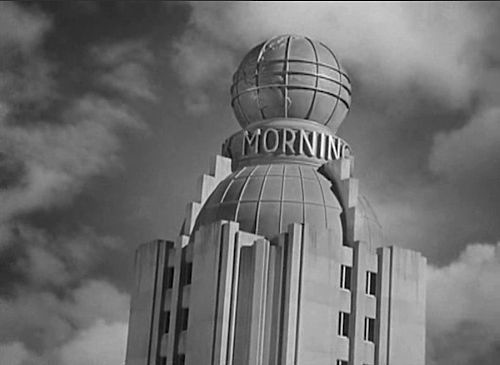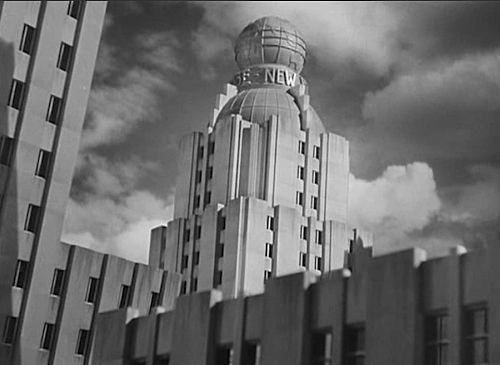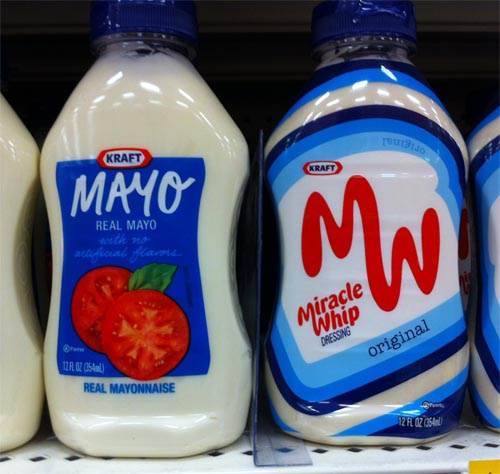
|
It’s also a picture of scorn for some: too much energy is consumed to heat the house, the wife probably stays at home in her glass prison, the house is too far from other houses and should be in a sustainably dense or densely sustainable neighborhood, the man believes the propaganda in the newspaper AND he’s smoking in front of children, and so on. I’m not saying this is the apex of human civilization here, and you certainly don’t have to want to live in a house like this, but if this picture makes you angry, you have larger problems. Reminds me of a quote that has stuck with me for decades. An interview with Denys Arcand, director of a movie called “The Decline of the American Empire.” (It’s about academics in Canada having sex.) He said that a declining empire wasn’t all bad; it can be a very pleasant place to live. Yes, if you’re living in the capitol, working for the Emperor’s court, which still expects and gets all the best food and wine and smartest new fashions and delicious gossip. If you’re working in town with a brother or father or son in the legions on the frontier, it’s not so pleasant. But decay is much more romantic, don’t you think? Decay is so much less taxing; there’s no bothersome feeling you should be building something, and anyway, you’re not quite sure how that’s done. Or why. The picture above is not the expression of a culture in decline. Nor, I suppose, is this:
Watched "Foreign Correspondent" this weekend, and was struck by the opening scene of the newspaper building. That's a newspaper building. The globe revolves, of course. Pull back, and it's an imaginary Rockefeller Center:
Thirties style: as clean a break with the past as you could get, but still connected to its culture. If anyone should have thought they were in decline, it was America in the thirties, but there's barely a whiff of declinism from the popular culture. It's all pick-yourself-up and clip Old Man Decline on the chin with a smart right hook. Something I noted today, with a weary sigh:
Once again today, after cleaning my system, I was asked if I wanted to share it. Hell, no. I cannot possibly think of any reason to tell anyone that I’d cleaned out 77MB from my caches. (The GB total is the cumulative amount from the app’s total usage.) It’s an excellent program, but things like this tell you there’s no one in modern companies capable of saying Hell, No when the issue of social media arises. Someone said “we should put a button on the main pane that lets people tweet their results," and there wasn’t anyone present who issued a gusty laugh then reached over and slapped the guy who made the suggestion. Then slapped him again and said “that’s for the Facebook link you’re thinking about and haven’t mentioned yet.” I mean, for heaven’s sake:
Let’s share this piece with Kaboodle, shall we? If you’re wondering what Kaboodle is, besides “Option #3 in a list of generic website names whose first two choices were championed by managers who hated each other, forcing the committee to choose the third one,” it’s this. You’d never guess it’s a Hearst site. Tell me that doesn’t look like a graveyard site, visited only by employees who tend the grass and remove dead flowers. Generic design, boxy boxy boxy. If you’re wondering what the site’s supposed to do - well, it’s for sharing! You share what you find with other people and they share with you and no one has to worry they’ll show up at the same party with the same shoes because everyone else is elsewhere. Even the ads have sharing buttons. There was PANIC AND TERROR when Sears rolled out the SearsStyle add and someone realized it lacked a Facebook like option. As if 983,934 people liking Sears means anything. The internet is a city, with main streets and back alleys and parks and brownstones and cafes. Facebook is an enormous enclosed stadium. Something I forgot to note yesterday when describing the Target run: Kraft has redesigned ALL the mayos - along with all their salad dressings - and reduced Miracle Whip down to two letters:
It’s Iconic! Smart move; it really stands out. But note how they still feel obliged to tell you it's Miracle Whip. Someone in the process argued for leaving that off. They'll figure it out. If you clutter it up, someone will just add something else, like "Original." We can see how that worked out.
I mentioned “Red Riding” yesterday. It’s come to occupy an interesting place in my head this year, because I’ve read two books in the quartet and seen two movies in the trilogy (they skipped “1977”) and I’m going to finish the movies this week. I hate this thing. I just loathe it, but I have to finish. On the trip I finished “1977,” which was a damned near unreadable mess - run-on sentences, interminable dream sequences - which are considerately printed in italics, so you can skip them - and thick slabs of WTF inner monologues referring to things you don’t know if you’re supposed to know about, or haven’t happened yet. Of course everyone is corrupt. Of course everyone is heedless of the consequences of their actions. Of course everyone drinks too much. Of course everyone is out of control except for the Bad Cops, who are stoic and Will Have None of That, Now when it comes to getting to the bottom of something or other. Here’s the thing: it’s about the Yorkshire Ripper. I remember that case; I remember the apprehension of the killer, Peter Sutcliffe. A straight-ahead story about the case and the police who worked on it over the years would make a great series of novels, but the author plugged his muse into the Elroy pedal and set the knobs to 11, and so it’s all about obsession and corruption and nasty businessmen who kill little girls and take their pictures in a subterranean lab when not planning shopping centres. The first novel annoyed me; the second, which I bought at the same time as the first, infuriated me, but I was keen to see how they turned it into a movie. They didn’t. They skipped it entirely, perhaps because someone wrote a summary and said “you know, nothing really happens. There’s a murder and there’s an old murder and one of the policeman has a yen for a hooker, and then the journalist has a yen for another hooker, and there’s a naughty magazine that connects them, but I’ll be damned if I know why I should care.” So they went right to the third novel, supposedly about a policeman brought in to supervise the Ripper investigation, and for a while you think: hey, a crime story! Awesome! The hero is the best of all the books so far, played with intelligence and an almost painful sense of caution and dread by XX, but . . . well . . . at the end . . . I just swore and hit the off switch on the TV and went to bed hating this thing all over again. Start the third one tonight. A description says the characters find some sort of “redemption,” but I couldn’t care less if this meant they did the right thing or turned in a book of Green Stamps for a carving knife set. Today: Comic Sins has been resorted and resized. Away with the old page-after-page-after-page paradigm, with the comic on top and the text on the bottom. I’ll have to do the same with the ad site, of course. OF COURSE. Anyway, it’s here, if you wish to reacquaint yourself with the project. You may ask: how long did that take? Really? About four hours, in four one-hour sessions. It was relaxing. And it's HERE. Enjoy; see you tomorrow.
|
||||||||||||
|
|
|||||||||||||
|
|||||||||||||
|
blog comments powered by Disqus
|

 I love this picture. It’s everything we take for granted. You have to see it as it was understood in 1950: the science-fiction world of the future, today. The enormous plate-glass front window keeping out the cold, while permitting a panoramic view of the world. Consider the normal experience before this, before the war: old drafty houses with small windows and a coal-fired furnace. You don’t see a radiator in this room, because it’s warmed by one small vent that’s NUCLEAR POWERED! Also, you don’t see a radiator because it’s an ad for glass, not the American Heat Your House To 76 Degrees Council.
I love this picture. It’s everything we take for granted. You have to see it as it was understood in 1950: the science-fiction world of the future, today. The enormous plate-glass front window keeping out the cold, while permitting a panoramic view of the world. Consider the normal experience before this, before the war: old drafty houses with small windows and a coal-fired furnace. You don’t see a radiator in this room, because it’s warmed by one small vent that’s NUCLEAR POWERED! Also, you don’t see a radiator because it’s an ad for glass, not the American Heat Your House To 76 Degrees Council. 



